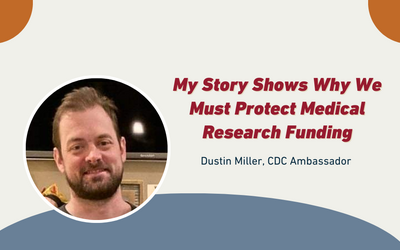
There’s been a lot of talk about federal funding cuts – to Medicaid, food assistance programs and medical research, which Congress is considering slashing by 40%. While lawmakers debate on Capitol Hill, the real impact falls on patients who rely on new treatments to survive and thrive. I know this firsthand.
As a teenager and well into adulthood, I battled relentless hives: blistering rashes, raw skin, and sleepless nights spent scratching. At work, I would wrap my hands in bandages so no one could see the sores forming. No prescription or over-the-counter cream brought relief; it was agonizing. Then, in my thirties, my allergist prescribed a new, FDA-approved injectable medication called Dupixent. Within weeks, the hives disappeared. I couldn’t believe it! For the first time in years, I felt like myself again.
This is the power of medical research. Treatments like Dupixent don’t just appear overnight — they are the result of decades of research, clinical trials, and public investment. Without that funding, there would have been no Dupixent for me and no hope for countless others waiting for breakthroughs that could transform or even save their lives.
Dr. Shuvo Roy, who leads The Kidney Project, and his team is developing a bioartificial kidney — a small device implanted into the body to replace a failing organ. He told me the biggest obstacle to bringing the device to market isn’t the science; it’s the funding. Without adequate support, projects like his stall, leaving patients without desperately needed options.
These are just a few examples of the crucial role medical research funding plays in ensuring patients with chronic diseases have access to treatments they need. Author Howard Zinn said it best, “If there are necessary sacrifices to be made for human progress, is it not essential to hold to the principle that those to be sacrificed must make the decision themselves?”
Patients and families living with chronic disease are the ones at stake. We should have a say before the funding that could save our lives is stripped away. Now is the time to act. Contact your representatives. Share your story. Make your voice heard. Medical research saves lives — and we cannot afford to let it be cut.